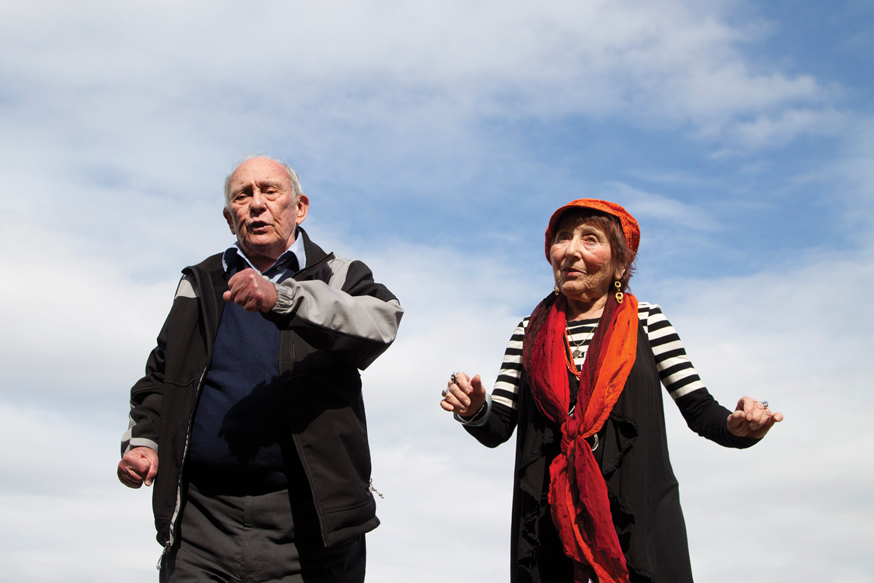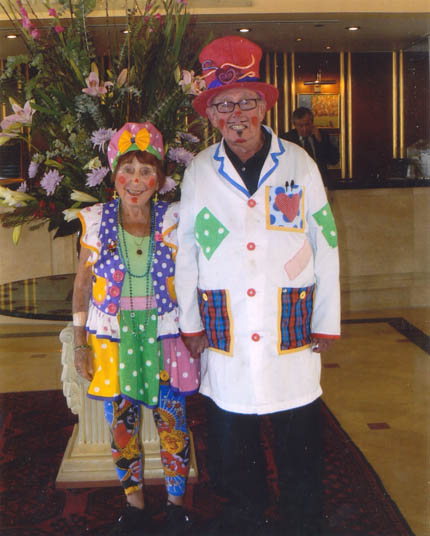Peripheral People
So constant we take them for granted, but definitely worth a closer look.
By Jennifer Liebrum
Photos by David N. Seelig
Most of us never think about the purpose of our peripheral vision. It's part of our annual eye test, but we normally don't care why, unless there's a problem. We learn in driving school that it can save us from an accident if we catch a glimpse of an oncoming car in time to take evasive measures.
More often, it protects us when we want to look at something that we are not bold enough to look at head-on. Looking might make us responsible for what we see, right?
Maybe there's something or someone on the periphery that we should pay more attention to. And not just to be safe. Perhaps, while we are busy looking straight ahead, there lies in the wings of our vision people and things we take for granted. People we should notice.
When I first saw Jerry and Varda Goldman a few years ago, they were shopping for tie-dyed clothing at the Mountain Mamas annual summer fest in Stanley. I'll admit, her age was what caught my eye. Although she had the body of a much younger hippie, she didn't exactly look like a Deadhead.
Yet there she was, with the theatricality one would expect from someone with an eye for such flair-wear, sashaying in and out of the tent in a tank top, or skirt, modeling for her bemused husband, who was waiting patiently in the sunshine, giving approving or disapproving feedback.
There was a fluidity between them that could only come from a special connectedness, not merely from being husband and wife, or even out of mutual regard; the admiration for one another was magnetic. And, I came to find out, it has been that way for pretty much every day of their 49 years together.
The next time I saw them, I was their waitress at the Ketchum Grill while seven months pregnant with twins. In that cozy restaurant, my belly couldn't be ignored, but most people could skip over the niceties and cut to their order without much delay.
I remember her ensemble as being akin to cotton candy. Just as the sugar cloud balances on the cardboard cone, so did her outfit of layered sheers. They floated effortlessly around her tiny frame in an ethereal manner, mimicking movement even after she was seated in my section. His outfit was sincere. Dark, tailored pants, with only a touch of the eccentric exhibited through some unusual, but hardly outlandish, suspenders. I wasn't surprised they were headed to the nexStage for a show, or maybe it was an author lecture.
I assumed they would treat me with the same polite disregard that many customers had, so I cut to the specials. I saw, though, that I had lost them at "Hello." She smiled broadly while whispering to him in a heavily accented voice, the origin of which I couldn't detect in the noisy room. He nodded in agreement.
"Forgive me for not listening, is it twins?" she asked. I affirmed and got back on task, but she was on her feet and gently holding my arm. I had to look down from my 5-foot, 4-inch perspective to somewhere in the 4-foot, 11-inch range to look in her light green eyes, wide with genuine excitement. "Good for you to keep working. It will keep you strong when you have those babies."
Her husband was equally elated, but more practical. "You know they can come early, so make sure you are eating right and getting lots of rest."
And that's how I found out that Jerry and Varda Goldman, he a retired doctor, she a dancer, he from New Jersey, she from Israel, had always wanted twins, that they have a son and an adopted daughter and a grandson. And then, with precision timing, moments before my lingering might have caused my co-workers to fuss, they got back to the business at hand.
When they left, she gave my wrists a squeeze, looked into my eyes and wished me luck. He uttered, "Blessings to your future family. Shalom." I thought what a lovely life this lovely couple must lead here as they walked away elbow to elbow.
Once I had children, I saw more and more of the Goldmans. Not socially, and not in their service.
I was seeing them in the most startling matriculation yet. This time, they were teamed as children's entertainers, puppeteers and, well, clowns. Wherever there were kids events, there were the Goldmans, aka Whimsy and Dr. Heart, making balloon animals, dancing, singing and mingling.
This would explain their synchronicity and syncopation, and perhaps, why they always seemed to be in a joy bubble. It definitely explained the circus music I swore I heard following them and their impeccable social and, now I could see, comedic timing.
Clearly, these were not your average Sun Valley retirees.
What it didn't explain was why.
I track them down first through their phone book listing, reading simply Varda's Birthday Box. Though they have a condo in Sun Valley, I find the Goldmans in a Boise hotel where they are staying while Jerry has his eye worked on and where she recently got two new hips.
In four visits—broken up for them to brunch at The Cheesecake Factory with friends—over recent weeks, it's no surprise that they have locked in arts events on their calendars, have been embraced by the congregation at the local synagogue and are the darlings of this hotel.
Emerging from the backseat of a car, Jerry grabs begrudgingly for his cane, which he uses to help compensate for his two bad legs, and she a matching, smaller version. She is less spry than two weeks earlier, and apologizes for it, explaining that she overdid it that morning doing her exercises.
"I'm very happy she only has two hips, and it's just as well we're not the same age," Jerry jokes. "I couldn't keep up with her."
The terminally impish Varda looks worried and anxious, and she wants to talk about the photo shoot. They won't be in costume, which is fine with her, but she's worried we'll make her "act natural" instead of being natural, which, she says, is to be "performing."
With that resolved, their only request is a flat surface and a cue to start. Their mirth needs no makeup. Their street clothes suffice. They demonstrate the program that gets them booked at birthdays and schools across the state and children's hospital wards in Israel. They are oblivious to the lookie-loos headed into the Boise mall.
Varda is energized. She becomes the assistant to Dr. Heart of the College of Puppetology, a specialist in PDs: puppet diseases. They sing a few songs and talk about scary things happening to Pinkie, the puppet with chronic tonguellitis. Each act is customized to the circumstance, but don't confuse that with improvisation. Jerry assures that Varda is thorough in her planning and uses her background in dance as therapy to maximize the crowd impact.
Such exaction keeps their bodies and minds nimble. They decline to discuss their ages in print because Varda believes she will lose work. You get the distinct impression that when the time comes that she can't do this, she will forget how to breathe. And when she does, he will too.
"My life was all school and I lived a dull life until I met Varda and it changed 180 percent," Jerry says.
Varda had arrived in America in her early 20s, having been given a release from the army. She had been a member of the Haganah—what she calls the Israeli underground—for several years. She left Israel, temporarily she thought, to study dance in the United States. She came here with only her coat and violin.
"I was alone, and I had the most wonderful experiences," she says. Dance was what she had to offer, so she took a chance on an audition. "I wasn't even sure what one was, but I took a chance and went anyway. Lo and behold, I won a scholarship, in spite of the fact that I wasn't familiar with American techniques. But I was always open to new ideas, and jobs came my way."
The New Jersey-born Jerry was a resident in medicine at Newark Beth Israel Hospital, playing his squeezebox for change in his spare time, and she was working as a dance therapist with emotionally disturbed boys, when a mutual friend decided they should meet.
Jerry crashed her Hanukkah party and the two stayed up drinking Turkish coffee and listening to chamber music until it was almost time for him to get back to work. A few hours, and a few bus rides later, Varda had him summoned to the front desk where she was waiting with barbecued chicken and a thermos of espresso.
"She said, 'I brought you lunch.' It was instant love," Jerry says. "I felt like I'd been hit with a brick. Three weeks later I found myself on a pair of skis on a hillside in Austria wondering how the hell I got here. I discovered a whole new world. Whatever I can say about life with Varda, I can't say it was ever boring. I just go where it takes us."
"See this?" he says, putting a bent arm exaggeratedly behind his back. "It's permanently twisted."
"I'm kind of spontaneous," she allows. "I don't fit in any mold."
They moved to Arizona while Jerry was in the Air Force and joined the Phoenix Ski Club, even though Jerry had never skied before they met. Varda was always accepting, or giving, invitations to people. They came to ride horses with a dozen friends as whimsically as they had taken up skiing.
"She comes at you with that big smile and those big, huge green eyes and people gravitate to her," Jerry says. "She can dialogue with anyone."
And so the pair began a lifetime habit of traveling places without making reservations, relying on good will and fate to deliver them an adventure. Jerry would continue his medical career, and Varda would continue to unleash her inner entertainer whenever and wherever she could. She taught at the YWCA, took classes and established a performing group to entertain children.
When son Ron was on the way, Varda decided to curtail her dancing because she really wanted a family. After a necessary hysterectomy, the couple decided to adopt.
"We decided there was enough room in our hearts and our home for at least one more child," Jerry said. "It was a three-year gestation! Finally the agency called and said, 'Would you mind if the biological parents were taller than your wife?' I said that if I wait for an unwed mother no taller than 5 feet I'll be waiting forever! They dropped this package in my arms, gosh, the most beautiful baby girl I had ever seen. We fell in love in 10 seconds."
They named her Nurit, Hebrew for buttercup. She's now 41, and "a big, good-looking broad living in California as a nanny," says her proud papa. Ron, 46, is an engineer there and he has a son, Bryce, 10.
It was while Varda was selling puppets at the San Mateo County Fair that she saw her next opportunity. There were a number of Shriner clowns—famous for their zippy little sports cars in parades—who stopped by her booth. She introduced herself and asked, "How do I get to be a clown?"
She told Jerry, "In two weeks we're going to a clown workshop." Jerry said, "What's this 'we'? Well, I'll go and watch. That lasted about 10 minutes. As soon as they put the greasepaint on me, I found I liked it. I knew I'd lost my mind. I knew damn well that I was nuts, but we had a ball."
Although Jerry says he was just being a good husband ("She just goes and I just grab hold and hang on."), Varda disagrees that he is an unwitting victim.
That's how these two work around each other—their act on the stage is friendly, clean and comes from a place of love. They are the people's comic couple, like Ann Meara and Jerry Stiller might have been as parents. Off stage, their stories are crafted a bit better with each retelling. They temper their statements with knowing looks and inoffensive eye rolls. Despite their claims that their coupling was a culture clash right out of the chute, "She has great comedic timing," says the clock-watching Jerry, "but a fine disregard for time." Their banter comes from a place of love.
And it carries over to those around them in the most innocuous moments. When David Seelig, who photographed the couple, was asked if by chance he was Jewish, he told them his most recent reason for avoiding organized practice was because a rabbi stood him up at his Catholic wife's burial services. They were visibly saddened.
"I wish I had known, I would have come," Jerry said. "That was not nice." And they invited him to join them at the Boise synagogue.
"They don't want to offend anyone," Varda says. "They know we don't keep a kosher home and that we drive to services."
"For him," adds Jerry, "there would be room."
The Goldmans have that effect on people, of compelling you to fearlessly have a dialogue about topics you've probably never told a friend, much less a stranger. When they are out of costume, you're the only one in their orbit. When they're in costume, even if you are among those who can only take your clowns on a case-by-case basis like I am, one cannot help but be drawn to them.
They see you. They hear you. And they always want to make it better.
"No meeting is a coincidence," Varda says.
Varda maintains that Jerry is always a self-deprecating ham with a half-empty-glass attitude and a short fuse, the result of trying to be the serious-minded man he's expected to be.
"He was a good Jewish boy. He wanted to do right for his family," Varda explains. "But he's a different kind of man, a different kind of doctor. He's nice and he relates to his patients."
At first, Jerry thought he wanted to be a pediatrician. And then there was Lloyd.
Lloyd would wait at the elevator when he knew rounds were starting and throw his arms around Jerry's legs, making the young doctor walk with him until he couldn't hold on any more. Lloyd was 4 and he had lymphosarcoma.
"The night that kid died, a piece of me died too," Jerry says, tearing up at the memory. The experience changed his career direction away from pediatrics. He became an internist instead. "So then I got teenagers with horrible diseases. I was doing rounds on 13 young people all in different stages of dying. I got so burned out. Things like that take pieces out of you."
His compassion for children is evident when he tells of how he was stabbed while taking his son to a night game at Candlestick Park in San Francisco. He seemed to take some responsibility for their actions, explaining that they had been running late and he made the choice to park in a known rough area. He describes the thugs as "three kids" who knifed him after they got impatient when he tried to separate his cash from a money clip his wife had given him. His boy, then 7, hid behind a car until his dad called for him, and they retreated to a nearby grocery.
"I saw that my wound was all around vital organs and was thinking that this was not good when Ron said, 'Are you going to die, Daddy?' I said, 'Not tonight, I've got other things to do!' Luckily, my amateur surgeon stuck that knife right between all the important items."
Jerry took a sabbatical to Sun Valley, which had become a regular escape for the little family over the years. He returned to the Bay Area to work in the emergency room, "where I could take care of the acute problem and turn them over to their regular doctors," and continued helping Varda with her various shows and craft fairs.
"Her world is fun," he says. "And I'm willing to do just about anything that sounds like fun. Even when I'm depressed, I put on a costume and I'm a different person. It's transformative."
They keep their suitcases packed with all the accoutrements of their trade: props, balloons for animal making, and a line of finely made puppets from Folkmanis, which Varda fell in love with when she opened an ecclectic store called Varda's in the '70s. The couple owned a Ketchum building where The Galleria now stands, and Varda was her own boss, keeping hours that suited her. Even today, they work without formal contracts, assuming that "you will keep your word." And when not on hire, they go wherever they feel people need a smile.
They are humbled by the affection they have received over the years. Recognized while eating out on a number of occasions, they have asked for the check only to find out that it has been taken care of.
"It happens all the time," Jerry says. "We ask, 'How come?' and they say it's for doing so much for their kids for so many years. We get a kick out of it."
"People," Varda says, eyes wide in mock amazement, "think we're cute or something."
But don't refer to them as elderly. Varda will tell you her age off the record, and Jerry will tell you he is five years younger. Still, "You can call us seniors because you get something back for it. Elderly I don't like," he says.
The last time I saw Varda and Jerry Goldman out entertaining was last summer, wrapping up a long, hot spell of balloon-making at Ketch'em Alive. They weren't using canes, but he was clutching his inhaler, and looking for the packing up help that was running behind. They looked dishearteningly frail and tired, and they reluctantly had to turn away a latecomer, not because time was up, which it was, but because Jerry wasn't feeling well. You can tell it hurt them both. Especially Varda.
A bout of breast cancer in 2000 made her more determined than ever to spread her brand of sunshine.
"I wasn't scared of the bullets flying around me in Israel, but I was afraid of cancer," she says. "You get totally self-centered when you're fighting cancer, but I learned a lot about the things I had forgotten when things were going well."
They studied her options together, and he respected her freedom to choose.
Once she decided the route of treatment she would take, Jerry says, Varda never looked down or back. "She would come in to the radiation room doing a little Japanese dance. She showed them it didn't have to be a sad place."
"I rediscovered what it means to entertain," she says. "But I also found out what marriage meant. I had the support of my husband every step of the way, which was incredibly important."
His late-onset asthma forced him to retire, and a bout of pneumonia with septic shock almost killed him last July.
"I knocked on the gates, but I wasn't ready to go in," he says.
The couple don't seem deterred. They plan to have their regular spot at the Ketchum Arts Festival this summer.
The last time I talked to Varda, she encouraged me to go see the new Grateful Dead movie. She and Jerry had gone the night before.
"Ask me what I wore," she said, and I complied. "Well, my tie-dyed top of course, because it makes me so happy."
|





